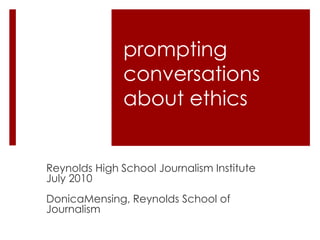
prompting conversations about ethics
- 1. promptingconversations about ethics Reynolds High School Journalism Institute July 2010 DonicaMensing, Reynolds School of Journalism
- 4. Survey results 30% admitted stealing from a store within the past year 23% said they stole something from a parent or other relative 42% said that they sometimes lie to save money 64% said they cheated on a test during the past yearSource: http://charactercounts.org/programs/reportcard/2008/index.html
- 5. What prevents ethical action? Inexperience / lack of awareness Emphasis on alternative criteria (economics, self-promotion) Indifference / intolerance Expediency / deadlines
- 6. What is ethics? Law is focused on the question of what do I have to do? Religion is focused on the question of what does God want me to do? Ethics is focused on the question: what should I do?
- 7. Ethical dilemmas When moral ideals conflict: honesty vs. loyalty, fairness vs. compassion, privacy vs. truth-telling When an action causes harm no matter what choice is made Put the focus on reasoning, not rules
- 8. What are some journalistic dilemmas you’ve encountered in your journalism work? Conflicts of interest Invasion of privacy Use of anonymous sources Plagiarism Sensationalism Coverage of sensitive topics Proportion, accuracy, judgment
- 10. Reasoning through dilemmas Consider relevant facts carefully Define your obligations Identify your ideals Consider the consequences Make a decision (Vincent Ryan Ruggiero, Thinking Critically about Ethical Issues)
- 11. Obligations Personal (respect others) Professional (SPJ Code of Ethics): Seek truth and report it Minimize harm Act independently Be accountable
- 12. Ideals Ideals are notions of excellence truthfulness fairness tolerance compassion loyalty forgiveness Integrity justice courage
- 13. Consequences Who will be affected by this action? In what ways? What short-term consequences are likely to occur? Long-term? If harm is unavoidable, can it be mitigated?
- 14. Decide which action is most ethical Talk through the dilemma with trusted colleagues or experienced journalists Consider alternative actions that could avoid the dilemma altogether Choose the alternative that you believe will result in the greater good or the lesser harm
- 15. Fallacies to avoid Watch for double standards: apply the same rules to yourself as you do to others Avoid unwarranted assumptions Avoid oversimplification Avoid hasty conclusions
- 16. Intellectual/ethical development There are right and wrong answers to every problem and authorities know what they are There are conflicting answers to most problems and only the individual knows what is right so it doesn’t matter which answer you choose All proposed solutions are supported by reasons within context Student integrates knowledge with personal experience and makes a commitment to responsibility (Simplified summary of William Perry’s nine steps of intellectual and ethical development in college students)
- 17. Dilemma A horrific two-car car accident occurred in front of the high school after a dance. Eight students were injured. Your best photographer happened to be there and got a hundred photos from before authorities arrived to the full rescue by police and medics. Your reporters have witnesses who said the drivers of both cars had been seen drinking outside the dance. Your paper only prints every other week and the deadline is in two days. Do you print a story? Front page or inside? What photos do you use? What names do you provide? What do you write about the cause of the accident?
- 18. Your assignment Get in groups of 3 to 4; you are now a small newspaper staff. You have to decide the details of the story you will print, where you will place it, the size and content of the accompanying photos Follow Ruggiero’s guidelines and be prepared to share the key facts, obligations, ideals and consequences that were most important to your decision
- 19. Your editor wants to print a story about the assault. The Hispanic student has agreed to describe what happened but he wants his identity kept confidential.
- 20. Culture makes a difference Ask questions about ethics, guide discussions, raise red flags; don’t wait for a crisis to have a conversation Encourage questions, make time for reconsideration, value multiple perspectives Understand that the outcome of a decision doesn’t necessarily bring relief, but sometimes doubt Keep track of outcomes, discuss consequences, mitigate harm
Notas del editor
- Ethics are about relationships: do I lie to my parents, do I cheat on my boyfriend, do I drink and drive, do I lie on this job application, do I cheat on a test, do I call in sick, do I report a friend who cheats, what do I do about a friend who’s confided a terrible secret and made me promise not to tell?In line with the theme that journalism education is education for life, ethics conversations are especially useful. They will help students improve their decisionmaking skills and reason through problems more fully and logically.
- Vincent Ryan Ruggiero, Professor Emeritus, State University of New York at Delhi, is recognized internationally as a pioneer in the movement to make the teaching of thinking a central emphasis in education.
- The challenge comes when our obligations conflict – then we have to pick the one that is most important under the circumstances.
- When ideals conflict, determine which ideal represents the greater good or the lesser evil, and choose the action which will result in the greater good.
